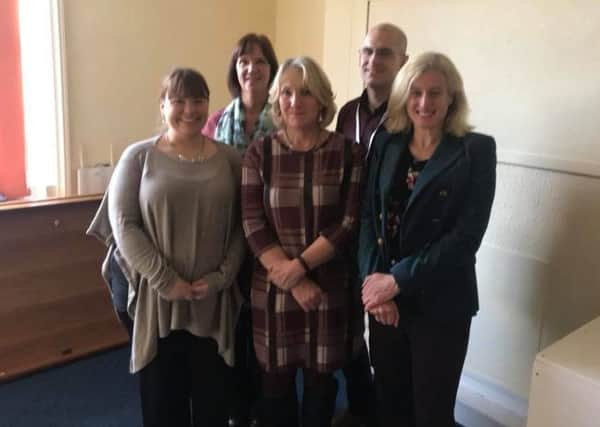Groups hit by funding cuts


The centre supports about 5,000 elderly and vulnerable people in the High Peak and Derbyshire Dales every year - with a number of services including transport, befriending and carers’ respite.
Two of its transport services are set to lose a third of their funding while its emergency respite and sitting service - which gives carers a vital break during times of crisis - will close down in April due to a 100 per cent funding cut.
Advertisement
Hide AdAdvertisement
Hide AdVCS Peaks and Dales chief executive Gills Geddes said services the charity provides would be losing up to 100 per cent of their funding.
She said: “Rather than making a knee-jerk reaction about losing all the affected services we will be looking at what we can now realistically provide in the light of the funding reduction.
“But this will hit the most vulnerable in the community because we support lonely and isolated older people.”
Speaking about the VCS cut High Peak MP Ruth George said: “I am appalled that Derbyshire’s Clinical Commissioning Group has agreed these short sighted cuts, which can only end up costing the NHS more in the long term.
Advertisement
Hide Ad“These services are hugely valued both by the elderly, often vulnerable, people who use the services – and by the volunteers who build a real bond with their clients.”
Advertisement
Hide AdIn a letter to the MP a volunteer befriender worried about cuts to her service wrote how crucial it was to elderly isolated people.
In the letter she described loneliness as an ‘invisible epidemic’ particularly in the High Peak where many elderly people live in or retire to villages on the outskirts of towns where they become less mobile and more isolated as they age.
She said: “The person I befriend has become so much chattier, less depressed and healthier in general since we have been seeing each other.
Advertisement
Hide Ad“I honestly believe befriending and regular companionship is the remedy to loneliness and if this service is cut then it’s going to be devastating for those who rely on their befrienders for social contact and feeling like someone cares.
“My ‘friend’ has told me about how it feels to be lonely -they don’t speak for days at a time and they haven’t been touched by another human for weeks until they go to the shop and the cashier gives them their change, or until the nurse gives them an injection.
Advertisement
Hide Ad“It’s heartbreaking because these lonely people have so much left to give and no one to give it to, and its something that is all too common in todays disconnected society.
“It only takes a smidge of empathy to understand why these services are vital.”
Advertisement
Hide AdFunding for dozens of other volunteer organisations as health chiefs seek to balance multi-million pound budget woes.
The half-a-million funding reduction, although a fraction of the £51 million in savings the CCGs must make, within a budget of £1.5 billion, has proven to be the centre of debate among the public and national and local politicians.
The organisations, ahead of this decision, had been spending £8.5 million a year on voluntary groups.
Advertisement
Hide AdIt’s new plan is to make a further £100,000 cut to infrastructure services in 2019, to cease £299,114 worth of discretionary grant funding by Marct but will continue the remaining £262,255 discretionary grant funding and to cease funding for vSPA, which helps signpost patients to health services, which costs the CCGs £155,000.
In total, cuts approved amount to £554,114.
Advertisement
Hide AdDr Richard Crowson, the lead clinician for mental health at Southern Derbyshire CCG, said: “I was on call yesterday, and there is a lady who calls up maybe six-to-seven times every day. Six or seven patients do that every day.
“Will there be more patients like this (as a result of the funding reductions) and how are we accounting for the unintended consequences?”
Zara Jones, executive director of commissioning operations for the Derbyshire CCGs, said “it would be difficult to say” what unintended consequences there may be.
Dr Debbie Austin, a governing body member for North Derbyshire CCG, said: “Take the amount of work that voluntary and community services do, if we reduce funding, do we get more people that end up in hospitals?
Advertisement
Hide AdAdvertisement
Hide Ad“I agree that it is not going to happen every day or on a massive scale but how are we going to monitor this risk?”
Ms Jones said that the organisations “had to look at making difficult decisions” and aims to “mitigate the risks” by collaborating with the voluntary sector.
Chief executive, Dr Chris Clayton, said: “It is unreasonable to take a broad brush view and say we cannot look at all at any of these areas.”
Dr Bruce Braithwaite, secondary care specialist and governing board member for North Derbyshire CCG, said: “The alternative is to find 30 patients whose hip replacements that we will not do and to keep the money in the voluntary sector.”